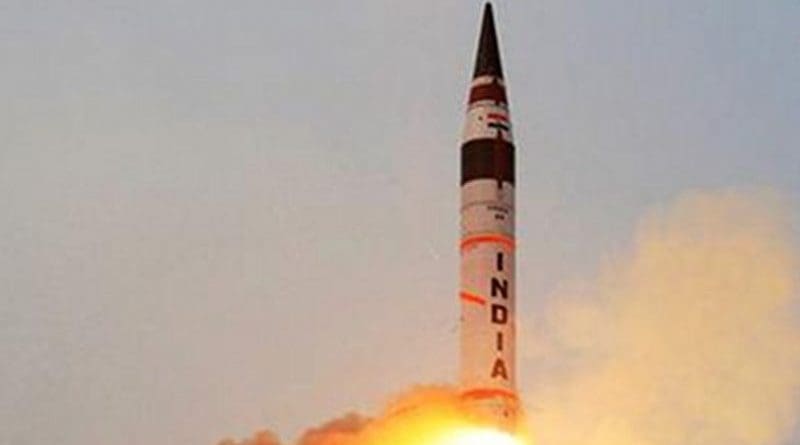India’s MTCR Membership: Scope Of Non-Proliferation And Emerging Regional Challenges – OpEd
By Asma Khalid*
The concerns about nuclear proliferation have compelled the strategic thinkers to continuously strive for establishing multiple legal tools to prevent the nuclear proliferation. As a result of such efforts, various non-proliferation regimes have been established to counter the risk of proliferation of weapon of mass destruction (WMDs) and control the transfer of nuclear related material and technologies.
The significant non-proliferation regimes that aims to minimize the transfer of WMD includes Zangger committee (ZG), Nuclear Supplier Group (NSG), Missile Technology Control Regime (MTCR), Australia group (AG) and Wassenar arrangement. These regimes issues common guidelines for export of WMD related technology and their decisions are based on consensus. Though, these four Nuclear Non-Proliferation regimes have managed to expose many potential nuclear threats thereby providing a pathway for the international community to disassemble WMD-relevant catastrophic plan. However, despite some remarkable achievements the regimes has failed to achieve the anticipated goals of non-proliferation and cooperation in the peaceful uses of nuclear technology. The most striking issue is that, these regimes especially MTCR and NSG are subjected to manipulation by those in power for their own interest contrary to the purposes for the creation of such regimes.
Missile Technology Control Regime (MTCR) is voluntary, informal association of countries that shares common interests in the nonproliferation of missiles, unmanned air vehicles (UAV), complete rocket system and related technologies capable of carrying minimum 500 kg to the distance of at least 300 km. MTCR is west-dominated cartel of 35 member states. India gained the membership of the Missile Technology Control Regime (MTCR) in 2016. The irony of issues is that United States has fully supported the India’s entry into four export control regimes: NSG, MTCR, Wassenaar Arrangement and the Australia Group.
Consequently, membership of the west-dominated cartel is proved significant for India’s missile and space program as candidacy of the cartel has not only allowed the India to sell the missiles under certain specifications, but it can also import the high-tech technology without facing the sanctions.
Subsequently, India’s entry to MTCR is highly valuable to India as it has improved the India’s credentials, which could be helpful to get the membership of NSG. In this scenario a significant matter arises that now India is in position to bargain with china for its inclusion in NSG where it might offer the MTCR membership to China. Though China is trying hard to get the candidacy of MTCR but according to experts it will not bargain with India to get the membership of MTCR. Because China has maintained very clear stance regarding the India’s membership of NSG and there is no room for compromise on China’s position that is based on principles.
Joining the MTCR will benefit the India in three main areas. First, there will be no legal complications for India to purchase missile related equipment from United States, Russia, Israel, Germany and United Kingdom. Secondly it will allow the India to full fill its wish to acquire drones such as the Reaper, Avenger. Third India has also been aiming at Israel’s Arrow II missile defence system.
Thus question arises that how India’s membership of MTCR will affect the regional stability? India’s aims of enhancing missile capabilities have ability to speed up missile proliferation in South Asia. Nonetheless, providing the waiver to India, major powers concessions and now providing access to sophisticated missile technologies proves the hawkish policies of western powers have always adhered to a state-centric approach in addressing proliferation challenge. These state-centric discriminatory policies encourage the India to create disparities in balance of power and enhance lethal arms race among South Asian nuclear adversaries. Though MTCR aims to control over the import, export and upgrading of missile related technologies but such developments are undermining the objectives of MTCR.
Moreover, some drawbacks of MTCR are also undermining its aim to curb the proliferation of WMD. First, non-offensive missiles and SLV can be converted into ballistic missiles and can be used for offensive purpose. Such as India development of Agni first stage missile through conversion of an SLV has proved the fact that interchangeable infrastructure, material and technology has severely undermined the scope of MTCR. Other striking issues are that decisions in MTCR are not binding and made on consensus, and lack mechanism to monitor the issues of compliance. MTCR have only partially succeeded in addressing the missile proliferation and allows member states to acquire sophisticated missile technologies under the umbrella of nuclear group.
To conclude, India’s inclusion in MTCR is aiding the India’s military satellite and missile program and it is against the aims of Missile Technology Control Regime. Therefore dynamics of Pakistan-China- India’s triangular relations present that India’s membership in the nuclear cartel will enhance Its missile capabilities in future which would further complicate the security equation, strategic balance and threat perception of regional states like China And Pakistan.
*Asma Khalid is a Research Associate at Strategic Vision Institute (SVI) Islamabad and can be reached at [email protected]


So according to this author India should be weak and unable to defend against Pakistan and China. Isn’t this a direct contradiction to power balance in South asia. India’s entry in MCTR has actually helped maintain the power balance vis a vis the mighty China. Oh just noticed this author is a pakistani providing the pakistan perspective. No wonder the contradiction.